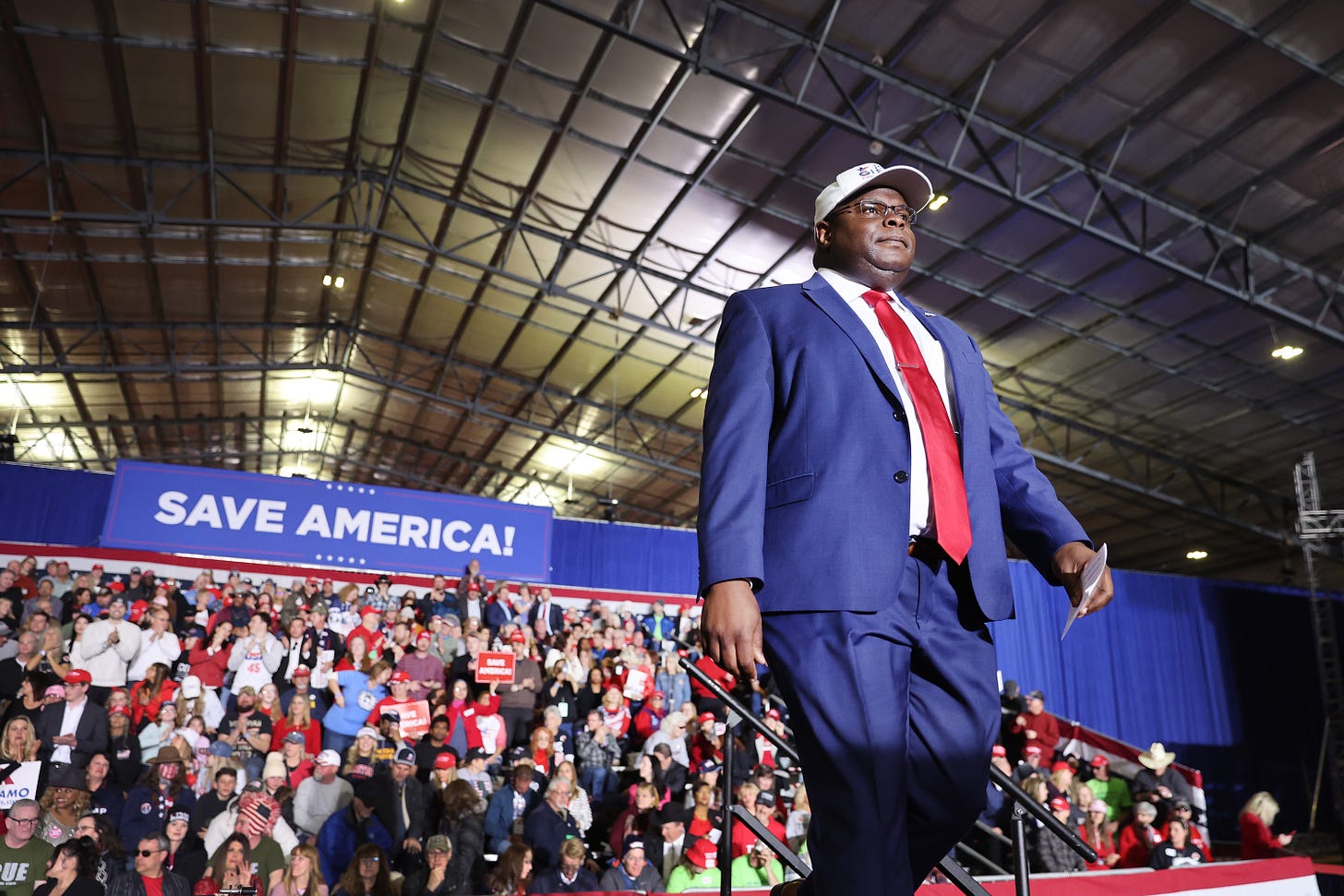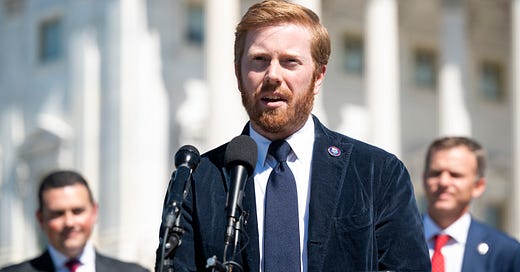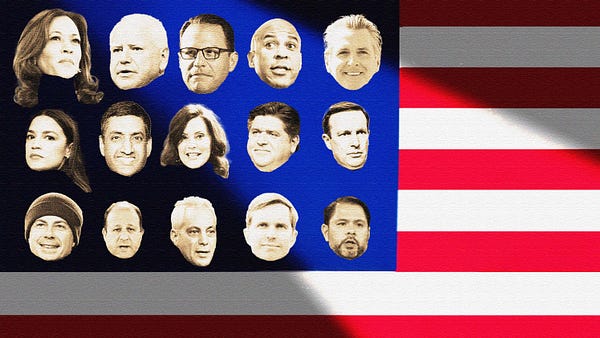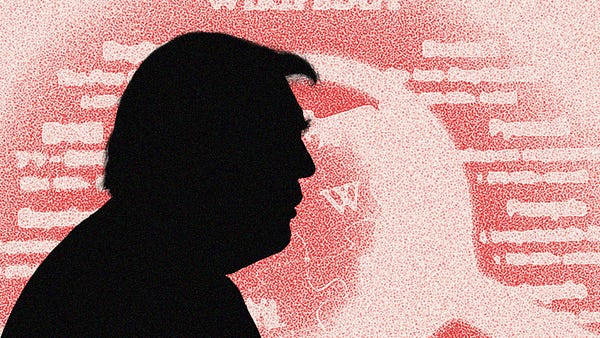
The Free Press

Tomorrow I’m facing off against John Gibbs in the Republican primary for Michigan’s Third Congressional District. The race is close. Internal polling has us within single digits of one another. But Gibbs and I couldn’t be more different.
I am a staunch defender of the Constitution and the rule of law. Accordingly, I became the first incoming freshman to recognize former Vice President Biden’s presidential victory. Then, three days after I was sworn into office in January 2021, I was in the House chamber when rioters overran the Capitol. A week later, I joined nine other Republicans, including Liz Cheney, to impeach then-President Donald Trump with a heavy but resolute conscience. I am the only freshman in history to impeach a president of his own party.
Gibbs, a former political appointee in the Trump administration, denies the results of the 2020 presidential election. (“I think when you look at the results of the 2020 election, there are anomalies in there, to put it very lightly, that are simply mathematically impossible,” he said last month in a televised debate.) Gibbs has accused Obama administration officials of taking part in bizarre Satanic rituals. He defended antisemites on his now-locked Twitter account, and has tweeted that Democrats are the party of “Islam, gender-bending, anti-police, ‘u racist!’”
Since the election of Donald Trump—and especially since January 6—Democrats have claimed that democracy is under grave threat. Party leaders like Sean Maloney, the head of the Democratic Congressional Campaign Committee, have claimed that we are in an existential conflict between defenders of democracy and advocates of authoritarianism. “It’s not just about Trump,” Rep. Maloney said late last month on MSNBC. “It’s about a MAGA Republican movement that is defined by serious, serious things like the attack on our democracy.” He warned: “It’s going to be those MAGA Republicans who take away your rights, your benefits and your freedoms.”
So you would think that the Democrats would look at John Gibbs and see the embodiment of what they say they most fear. That as patriots they would use every tool at their disposal to defeat him and similar candidates that they’ve said are an existential threat.
Instead they are funding Gibbs.
Democrats like Maloney argued that Republicans who looked the other way during the Trump era put party over country. But they know of what they speak: In one of many such naked political gambits aimed at elevating the weaker Republican candidate ahead of the November midterm elections, the Democratic Congressional Campaign Committee (DCCC) launched a $435,000 ad buy to promote the election-denying Gibbs in the final days leading up to our primary.
This is not an insignificant amount of money for the Gibbs campaign, nor is it an insignificant act by Democrats. The DCCC’s ad buy was more than Gibbs raised over the entire duration of his campaign. It was also nearly 100x the support Donald Trump himself offered to Gibbs (a single $5,000 contribution from the Save America Super PAC). In other words, the Democrats are not merely attempting to boost a candidate over the finish line: They are subsidizing his entire campaign.
Over the past year, in private and in public, these Democratic colleagues praised the courage of Republicans like me. Majority Leader Steny Hoyer called my vote “an impressive display of courage and integrity.” To leading Democrats, we were the Good Republicans.
At the same time, to some in my party, we were Bad Republicans—RINOs at best, traitors at worst. After the impeachment vote, I was immediately censured by two county parties in my old district. In my new district, the Republican Party of the largest county repudiated me a few weeks ago. The Michigan GOP Chair joked about my assassination. There have been too many online threats to count.
Watching this unraveling inside my party has been utterly bewildering. The only thing that has been more nauseating has been the capacity of my Democratic colleagues to sell out any pretense of principle for political expediency—at once decrying the downfall of democracy while rationalizing the use of their hard-raised dollars to prop up the supposed object of their fears.

The Democrats are justifying this political jiu-jitsu by making the argument that politics is a tough business. I don’t disagree. But that toughness is bound by certain moral limits: Those who participated in the attack on the Capitol, for example, clearly fall outside those limits. But over the course of the midterms, Democrats seem to have forgotten just where those limits lie.
Arizona Rep. Ruben Gallego, a Democrat and a fellow Iraq War veteran, took a heroic stand in the House chamber on January 6. In an April interview with Politico, Gallego recounted removing his jacket in case he had to fight his way out of the chamber, that he “would have killed all those motherfuckers to save this democracy. Like, I survived a war. Whatever it took, I was going to survive.” Yet last week, Gallego defended his DCCC dollars going to a staunch supporter of ‘those motherfuckers,’ tweeting, “You help a far right member of Congress who will vote for McCarthy to be leader or ‘moderate’ Republican to vote for McCarthy to be leader. Politics ain’t beanbag.” Indeed politics ain’t, and as Gallego gears up to primary Senator Kyrsten Sinema in 2024, it’s clear he will rationalize what is needed to survive in Democrats’ good graces.
Likewise, Rep. Jamie Raskin, one of the impeachment managers for Trump’s second Senate trial and a leading member of the January 6 Select Committee, spoke stirringly of the Federalist Papers’ warning about “opportunistic politicians who desire to rule at all cost.” But the very next week, Raskin swapped Hamilton for Sartre, rationalizing away the DCCC strategy, because, “in the real world of politics, one can see an argument if the pro-insurrectionist, election-denier wing of the Republican caucus is already dominant.” He concluded, “Jean-Paul Sartre said that in politics we all have dirty hands up to our elbows. Nobody’s pure.”
Or look at Rep. Elaine Luria, another member of the January 6 Select Committee. Luria supported her DCCC dues going to back John Gibbs on the hollow grounds that “voters deserve to know the truth about these candidates.” In a press release on the one-year anniversary of January 6, Luria noted the gravity of the Select Committee’s work, citing Abraham Lincoln on threats to our Republic: “If destruction be our lot we must ourselves be its author and finisher.” Here, finally, a rare note of agreement between MAGA on the right and the DCCC on the left.
It’s not just my race in Michigan. While claiming the moral high ground, Democrats have been busy rewarding candidates like my opponent across the country:
Colorado: Democrats have spent $4 million on TV and digital ads to elevate January 6th attendee Ron Hanks over moderate businessman Joe O’Dea in the GOP Senate primary.
Pennsylvania: Democratic gubernatorial candidate Attorney General Josh Shapiro boosted the election-denying, January 6-attending GOP candidate Doug Mastriano in television ads, spending in one ad double what Mastriano had spent on his own campaign. Mastriano is now the gubernatorial nominee in a swing state.
Maryland: The Democratic Governors Association spent hundreds of thousands of dollars boosting Dan Cox, who not only attended the rally on January 6 but called Mike Pence a traitor as the violence unfolded.
Illinois: The Democratic Governors Association dropped $35 million on Super PAC ads targeting moderate Republican mayor of Aurora Richard Irvin and elevating his election-denying, Trump-endorsed opponent, Darren Bailey, who ultimately won the nomination.
Conventional wisdom dictates that these extreme candidates are less electable than the normal Republicans Democrats targeted to defeat. But with a historically unpopular president in Joe Biden and inflation at 40-year highs, less-electable doesn’t mean un-electable. As the January 6 Select Committee continues to warn about the ongoing threat to democracy, their own party dues are paying to help elect the same villains they rail against.
My predecessor, libertarian Justin Amash, warned of the “death spiral of partisanship” days after he left the Republican Party on July 4, 2019, after impeaching former President Trump. It is one thing to read and reflect on his warning, and another to live it in real time. If successful, Republican voters will be blamed if any of these candidates are ultimately elected, but there is no doubt Democrats’ fingerprints will be on the weapon. We should never forget it.
A few things:
You can follow Rep. Peter Meijer on Twitter.
If you missed our recent Honestly roundtable on the state of American democracy—with Jonah Goldberg (The Dispatch), Jeremy Peters (The New York Times) and pollster Kristen Soltis Anderson—listen here:
Most importantly, if you appreciate pieces like this one please become a subscriber today:













Imagine what extreme measures a desperate Democratic establishment couldd take to ensure only the most frenzied Maga candidates and public figures rise to the forefront of politics prior to elections. Since the Jan 6th hearings failed to sway anyone. They must think outside the box, utilizing the full weight of media. Biden sending the FBI into Mar a lago for a raid is just a preview of what we are in for. Could anything energize the right wing fringe more than such overreach at Trump and fellow Maga candidates? Dems know they only do stand a chance when national attention is on how crazy Republicans react. They want more crazy, at all costs.
I'm no politician, but this seems pretty basic. It's far harder to defeat an incumbent in an election. If Meijer loses his primary, Dems don't have to defeat an incumbent. This piece comes across as whining from a toady who has done everything he could to ingratiate himself to Democrats, then feels betrayed (and, hilariously, surprised) when Democrats work to unseat him.